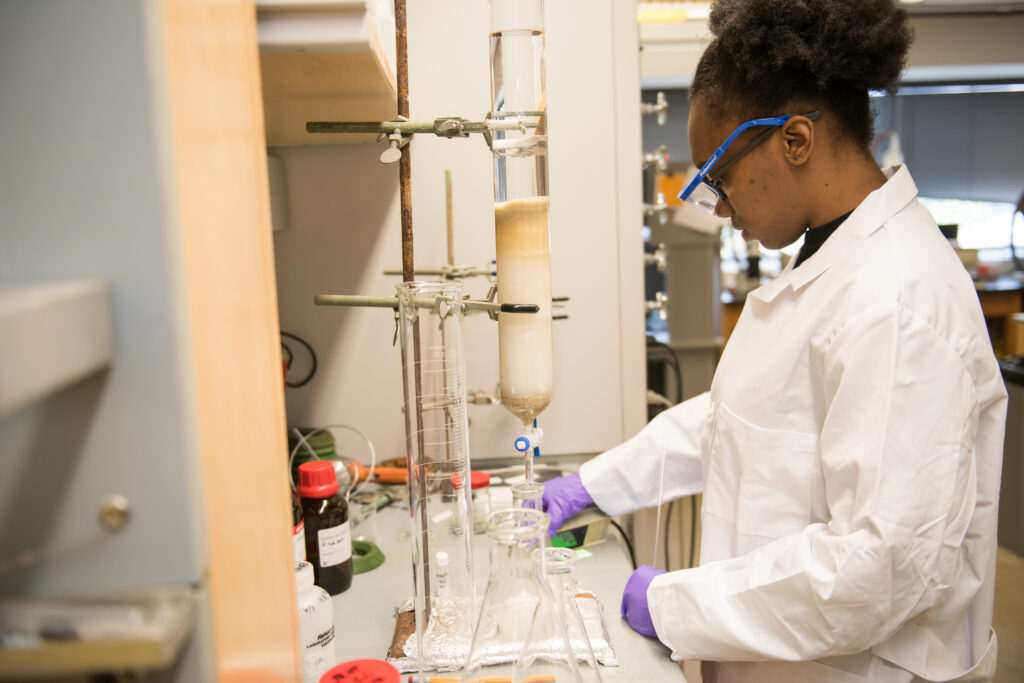Katherine Seley-Radtke, professor of chemistry and biochemistry, has received a six-month Fast Grant to test antiviral compounds developed in her lab for effectiveness against COVID-19. Collaborators on the grant include Chuck Bieberich, professor of biological sciences at UMBC, and colleagues at Johns Hopkins University and Cornell University.
“A normal NIH grant takes almost a year from submission to receiving the money, and in this time of crisis, we don’t have that luxury,” Seley-Radtke says. “The Fast Grants program awards funding in days, thus allowing us to get critical results immediately.” The Fast Grants are funded by a consortium of entrepreneurs, investors, and innovators, and applications are judged by a panel of biomedical experts.
The grants have only been given to the most promising projects that can return results quickly. Many have gone to some of the most prestigious research institutions in the world, including Stanford University, MIT, and Columbia University. “We are honored to be included in such company,” Seley-Radtke says.

A flexible approach
Seley-Radtke’s research has already shown that her compounds act powerfully against viruses such as Ebola, MERS, SARS, Zika, Dengue, and other human coronaviruses that cause cold symptoms. The compounds work similarly to Remdesivir, another antiviral compound undergoing trials for its efficacy against COVID-19. Seley-Radtke’s compounds are distinctive in that their structure allows them to adopt different shapes, affording them several advantages over Remdesivir.
These “fleximers,” as Seley-Radtke has named them, interfere with two different viral enzymes that the virus needs to replicate; Remdesivir interferes with just one. The fleximers stop the viral enzymes without harming very similar human ones, which is critical to making the compounds safe, Seley-Radtke explains.
The fleximers can also avoid being rendered inactive by a coronavirus defense mechanism. Coronaviruses have a special enzyme that seeks out and removes unnatural compounds that the virus has mistakenly incorporated into its replication process. The fleximers’ ability to take on different shapes protects them from this defense. The compounds’ flexibility also helps them maintain potency in the face of viral resistance.
“Given that recent reports suggest more than 40 different strains of SARS CoV-2 are currently circulating, the ability to avoid resistant mechanisms will be critical for developing a clinically relevant antiviral,” Seley-Radtke says.

Gathering crucial data
These compounds have already shown activity against SARS COV-2 in test tubes, but there are still many steps in the journey toward an approved drug for human use, including studies in animals and then human trials.
“Our efforts for the Fast Grant award will be focused on obtaining the critical animal data needed to move these potent compounds toward clinical trials,” Seley-Radtke says. “Although we have been working on SARS, MERS, and human coronaviruses for a number of years, the awarding of these funds is indeed validation of the importance of our work. And it is particularly important given the urgency due to the ongoing pandemic.”
Seley-Radtke has also been active in sharing her expertise in the media, including writing articles for The Conversation that have garnered nearly 800,000 reads. She has also spoken with news outlets such as the BBC, Washington Post, NPR, Washington Examiner, and many more.
Banner image: Katherine Seley-Radtke. Photo by Matt Radtke.
Other photos by Marlayna Demond ’11 for UMBC.
Tags: ChemBiochem, CNMS, COVIDresearch, Research

